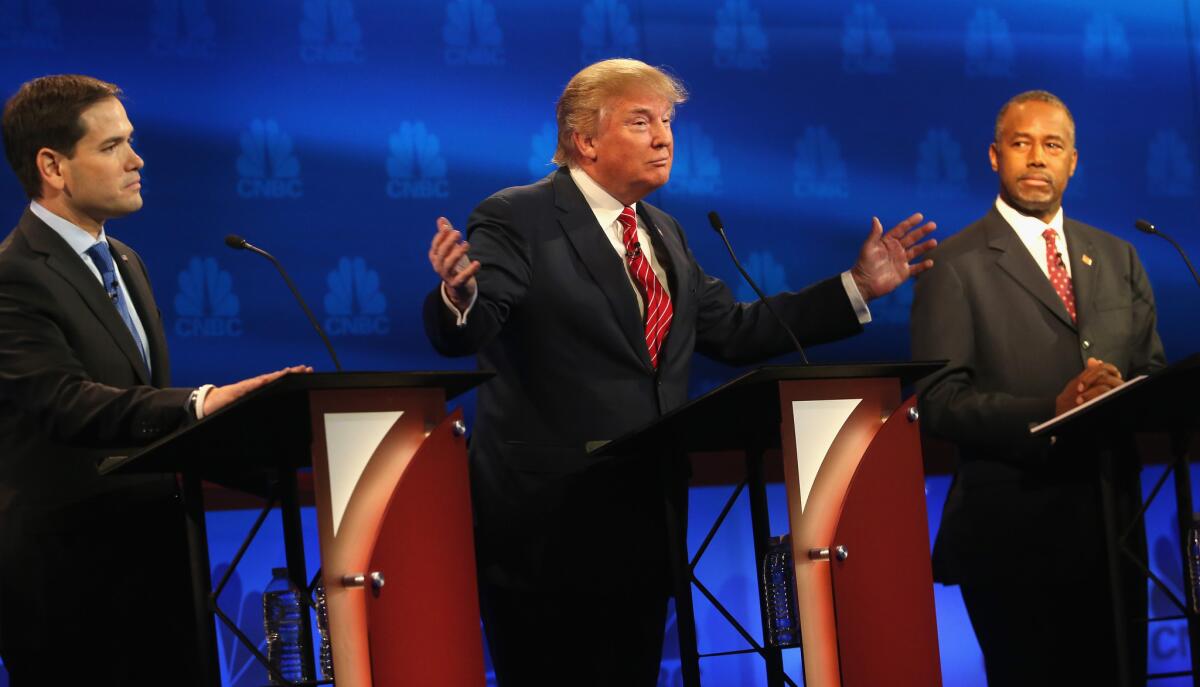14 million viewers for Republican presidential debate a record for CNBC

Sen. Marco Rubio (R-Fla.), left, Donald Trump and Ben Carson onstage at the CNBC Republican presidential debate Oct. 28, 2015, in Boulder, Colo.
- Share via
The Republican presidential primary debate continued its run as the season’s hottest TV ratings hit, delivering an average of 14 million viewers for CNBC.
It was the highest Nielsen number ever in the 26-year history of NBCUniversal’s niche cable channel covering business and finance news, which typically averages about 343,000 viewers in prime time. The audience for the third GOP candidate showdown Wednesday even topped Fox’s telecast of Game 2 of the World Series, which averaged 13.7 million viewers, according to Nielsen.
But it will not go down as one of the greatest nights in TV journalism, and it’s not just partisan pundits who complained about the performance of the three CNBC moderators: Carl Quintanilla, Becky Quick and John Harwood.
NEWSLETTER: Get the day’s top headlines >>
“It was an odd evening,” said Kathleen Hall Jamieson, a professor at the Annenberg School for Communication at the University of Pennsylvania, who worried that the harsh tone of the night would “legitimize” claims that the media is biased against Republicans.
“You don’t lead a debate by asking about weaknesses when the field of candidates is still getting to be known by the public,” Jamieson said, referring to Quintanilla’s opening query. “It’s a question that a competent candidate doesn’t answer or doesn’t answer truthfully.”
Suggesting that a candidate’s campaign might be “comic book style,” as Harwood did to front-runner Donald Trump, “invites the candidate to dismiss the question instead of answering it. It bordered on ridicule,” Jamieson said.
Quick had perhaps the worst moment as she asked Trump about his criticism of Facebook founder Mark Zuckerberg for bringing in immigrant workers. When Trump falsely denied it, she did not have her source material — the candidate’s own website — at the ready to call him on it. Jamieson said the exchange “suggested incompetence.”
CNBC stood by the performance of its moderators but would go no further for the record than its initial statement that said, “People who want to be president of the United States should be able to answer tough questions.”
Privately, one CNBC executive who was not authorized to speak publicly said the night served its purpose of enabling several of the candidates to distinguish themselves from the crowded field. “The goal was to be the most substantive debate — it changed the narrative,” the executive said.
The executive also confirmed reports that officials from the Republican Party and the Jeb Bush campaign told CNBC executives that Bush did not get enough speaking time onstage. Republican National Committee Chairman Reince Priebus was among the most vocal critics of the debate afterward, saying CNBC should be “ashamed” of its questions.
The messy stylistic moments during the night allowed competing cable news channels to pile on in the criticism during their post-debate coverage (there was none on CNBC, which used its big ratings lead-in to boost an episode of its reality show “The Profit”).
CNN reported that the moderators lost control of the debate, while Fox News commentator Charles Krauthammer described their performance as “appalling.”
Fox News had the strongest interest in pointing out the deficiencies in CNBC’s showing as its own Fox Business Network will air the next Republican debate Nov. 10.
Launched in 2007, Fox Business Network has fought to become a serious threat to CNBC in a TV landscape in which there appears to be barely enough audience to support even one financial channel (CNBC no longer uses Nielsen ratings to measure viewing for its financial coverage).
The upcoming Fox Business Network debate, which includes former CNBC star Maria Bartiromo as one of its moderators, provides a chance to present a contrast for viewers on a big stage. Bartiromo left CNBC in 2013 after a 20-year career there reporting and anchoring financial news.
Although CNBC’s debate audience is smaller than the ones drawn by Fox News Channel and CNN, the events are still major must-see attractions in a fractionalized TV universe. Even with just 75% of the 14 million viewers who watched Wednesday, the Fox Business News debate will be a massive platform for a channel that is still not on many people’s radar.
“It’s fabulous for Fox Business,” said an executive at another cable news network not authorized to discuss the matter publicly. “They will go all substance and policy, and Maria will lead the show. She will love nothing more than to show up CNBC.”
But no one expects CNBC’s rocky night to damage its reputation long term. “People have short memories,” one former CNBC executive said.
Many of the second-day analysis by political writers showed that the claims the moderators raised in their questions that the candidates disputed were factually accurate.
NBC News executives said privately that the backlash against CNBC was not expected to affect their organization’s relationship with the Republican Party. The network has two primary debates coming up early next year. CNBC operates separately from the NBC News division and does not report to NBC and MSNBC Chairman Andrew Lack.
Follow me on Twitter @SteveBattaglio
MORE ON DEBATE:
Candidates attack one another and the media
Third GOP debate appears to broaden field, not winnow it
GOP debate blow-by-blow: How it all played out
More to Read
Sign up for The Envelope
Get exclusive awards season news, in-depth interviews and columnist Glenn Whipp’s must-read analysis straight to your inbox.
You may occasionally receive promotional content from the Los Angeles Times.







